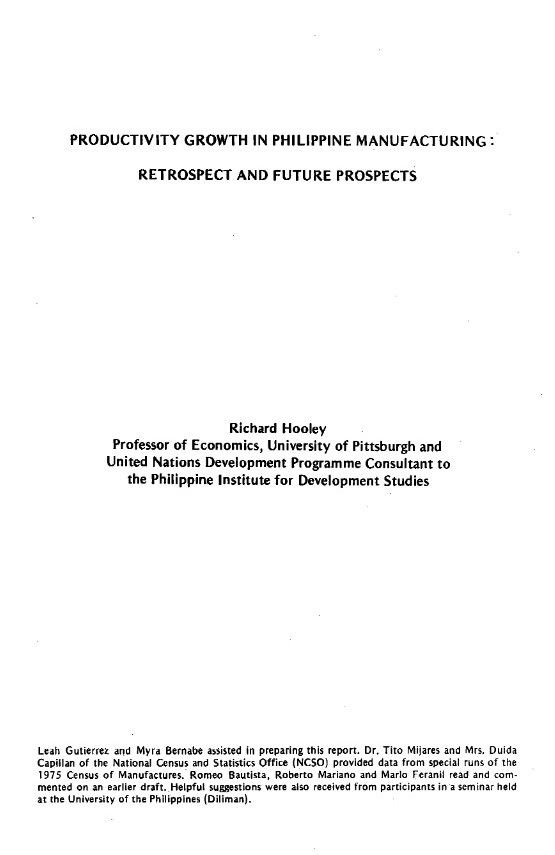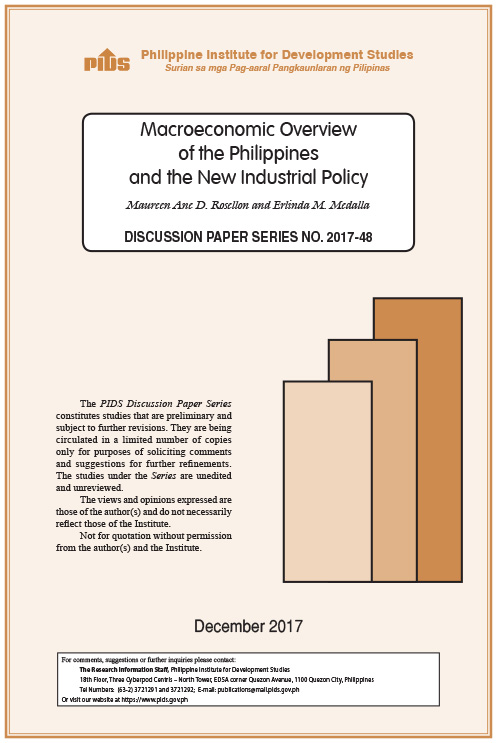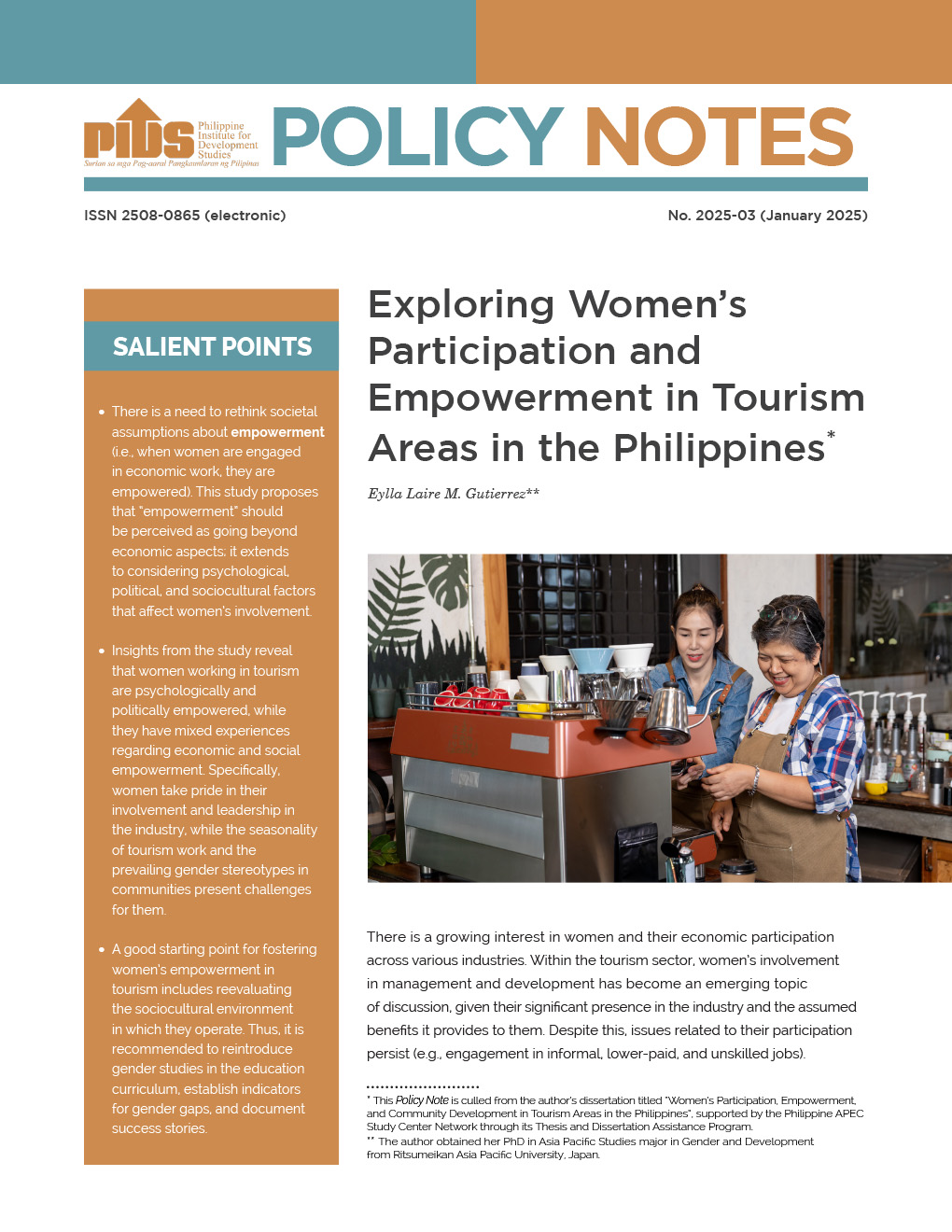The government needs an inclusive growth model to transform the industrial sector into a key player in generating investment, employment, and innovation.
A research study by PIDS Senior Research Fellow Rafaelita Aldaba recommends to the present administration to implement industrial policy reforms that will enhance the country`s firm productivity, deepen linkages of domestic firms and small and medium enterprises (SMEs) with large domestic and multinational companies, and gain more investment inflows. This is to capitalize on the rapidly changing global conditions wherein emerging economies like the Philippines are becoming key players as the United States, European Union, and Japan continue to face slower growth, said Aldaba.
She noted the need for the revival of the manufacturing sector to attain more inclusive and sustained growth. The sector`s weak performance is clearly manifested by its low contribution to employment, investment, and productivity growth. Manufacturing growth was slow, averaging only 0.9 percent and 2.5 percent in the 1980s and 1990s, respectively. Modest growth was also posted in the 2000s at 4.1 percent.
Aldaba also emphasized that the country`s manufacturing export base has become less diversified with the country`s exports heavily concentrated in three product groups: automotive and electronic parts and components, garments and textile, and machinery and transport equipment. These are low value-added and labor-intensive product sectors and considerably dependent on imported inputs.
To transform the industrial sector into a strong engine for economic growth, the country needs an industrial policy that focuses in the short-run on strengthening emerging industry champions, maintaining the competitiveness of industries where the country has comparative advantage and rebuilding the existing capacity of industries especially those with strong potential to generate employment, address missing gaps, and create linkages and spillover effects. In the medium term, Aldaba suggests new investments and expansion in upstream and core sectors such as iron and steel and other metals as well as in intermediate parts and components industries. In the long-run, a globally competitive manufacturing industry with strong forward and backward linkages is envisioned with the Philippines as active participant in the production networks of companies engaged in the manufacture of food, garments, electronics, and machinery.
A Comprehensive Manufacturing Industry Roadmap is being formulated by the Department of Trade and Industry-Board of Investments, and the Philippine Institute for Development Studies, to identify industrial activities where the Philippines may have strong potential for sustained growth and job generation.
You may read the full study by downloading the following links: http://dirp4.pids.gov.ph/ris/dps/pidsdps1321.pdf
A research study by PIDS Senior Research Fellow Rafaelita Aldaba recommends to the present administration to implement industrial policy reforms that will enhance the country`s firm productivity, deepen linkages of domestic firms and small and medium enterprises (SMEs) with large domestic and multinational companies, and gain more investment inflows. This is to capitalize on the rapidly changing global conditions wherein emerging economies like the Philippines are becoming key players as the United States, European Union, and Japan continue to face slower growth, said Aldaba.
She noted the need for the revival of the manufacturing sector to attain more inclusive and sustained growth. The sector`s weak performance is clearly manifested by its low contribution to employment, investment, and productivity growth. Manufacturing growth was slow, averaging only 0.9 percent and 2.5 percent in the 1980s and 1990s, respectively. Modest growth was also posted in the 2000s at 4.1 percent.
Aldaba also emphasized that the country`s manufacturing export base has become less diversified with the country`s exports heavily concentrated in three product groups: automotive and electronic parts and components, garments and textile, and machinery and transport equipment. These are low value-added and labor-intensive product sectors and considerably dependent on imported inputs.
To transform the industrial sector into a strong engine for economic growth, the country needs an industrial policy that focuses in the short-run on strengthening emerging industry champions, maintaining the competitiveness of industries where the country has comparative advantage and rebuilding the existing capacity of industries especially those with strong potential to generate employment, address missing gaps, and create linkages and spillover effects. In the medium term, Aldaba suggests new investments and expansion in upstream and core sectors such as iron and steel and other metals as well as in intermediate parts and components industries. In the long-run, a globally competitive manufacturing industry with strong forward and backward linkages is envisioned with the Philippines as active participant in the production networks of companies engaged in the manufacture of food, garments, electronics, and machinery.
A Comprehensive Manufacturing Industry Roadmap is being formulated by the Department of Trade and Industry-Board of Investments, and the Philippine Institute for Development Studies, to identify industrial activities where the Philippines may have strong potential for sustained growth and job generation.
You may read the full study by downloading the following links: http://dirp4.pids.gov.ph/ris/dps/pidsdps1321.pdf










